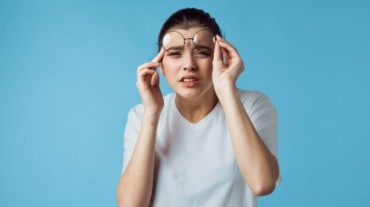
A dry eye flare is an acute inflammatory response, usually brought on by triggers such as work-from-home environments (where patients are spending increased time in front of screens), contact lenses, or MADE (mask-associated dry eye).
MADE occurs when exhaled air is funneled upward and across the surface of the eyes; typically when the wearer’s mask is not properly fitted. A recent review concluded that eye dryness and irritation from mask wear may become a problem for a large percentage of the population.

Often considered a chronic condition, DED (dry eye disease) can also be episodic in nature; not all patients experience consistent symptoms. Rather, they experience dry eye flares with varying levels of discomfort, as a result of a variety of potential triggers. Though 80-90% of patients who receive a diagnosis of DED will also have periods of inflammatory exacerbation or flares, surveys also reveal that nearly half of the patients report suffering from flares alone.
Patients with a dry eye may have altered vision, discomfort, a burning sensation, and discharge. Another category includes patients who are completely asymptomatic most of the year; however, they suffer from periodic dry eye flares. The number of episodes can vary; perhaps, four to six times a year with short bouts.
Moreover, data reveals that patients with DED have an average of about 4-6 dry eye flares per year, lasting between 7-14 days. When flares happen, patients struggle through the episode, typically self-treating with OTC therapies that fall short, because they do not address the underlying inflammatory cycle.
People with dry eyes may experience irritated, gritty, scratchy, or burning eyes, a feeling of something in their eyes, excess watering, and blurred vision.
Also Read: Keep your eyes in the best shape with these simple and effective eye care tips

Apart from the commonly observed symptoms mentioned above, some people with chronic dry eye will notice that their symptoms become worse at night. There could be a variety of reasons for this, including fatigue from using your eyes all day, changes in your metabolism at night, and certain medical conditions.
Dry eye can be a temporary or chronic condition. In a chronic case, your symptoms may get better or worse but never go away completely. Chronic dry eye occurs when your eyes can’t produce enough tears.

Select Topics of your interest and let us customize your feed.
PERSONALISE NOW